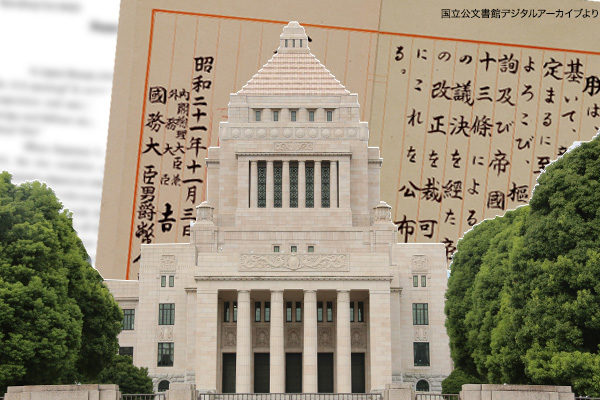After the first Abe cabinet, followed by the Fukuda and Aso cabinets, the Democratic Party of Japan took government from the Liberal Democratic Party through a House of Representatives election in the autumn of 2009. On February 5, 2010, Like-minded lawmakers including me launched a group called Sosei Nippon (Creating Japan) that comprised mostly LDP lawmakers across different factions and was chaired by Shinzo Abe who had recovered from illness.
I served as vice chair of the group. The other vice chairs included Keiji Furuya, Hakubun Shimomura, Yoshihide Suga and Hiroshige Seko. Seiichi Eto was named secretary-general. Deputy secretaries-general included Yoshitaka Shindo, Yasutoshi Nishimura, Taku Eto, Eriko Yamatani and Haruko Arimura. Katsunobu Kato became chief of the secretariat. These lawmakers worked to realize the second Abe cabinet later.
Position the Self-Defense Forces as “Armed Forces”
The group’s guiding principles announced on the day include the following passage:
“We have no choice but to strongly realize our responsibility for having failed to amend the constitution even once since the end of World War II, defend our country on our own, convey Japan’s proud history and traditions to next generations through school education or reform public servant and other administrative systems sufficiently. In order to revive Japan as a proud independent country, we must break away from the ‘postwar regime’ at any cost.”
On April 27, 2012, the LDP published a draft constitutional amendment covering whole constitution from the preamble to Article 102. Although the LDP had offered a draft constitution covering all articles in 2005, we worked out the new draft amendment through discussions at more than 50 meetings over two and a half years after the LDP lost government. I still believe that the 2012 version is the best. Particularly, I stuck to Japan’s possession of “Armed Forces” in my repeated comments at heated discussions on the draft.
In December 2012, the LDP won back government through a House of Representatives election, leading to the inauguration of the second Abe cabinet. At a plenary session of the House of Councilors on February 1, 2013, Prime Minister Abe said:
“The LDP’s draft amended constitution positions the Self-Defense Forces as Armed Forces. The SDF, though falling short of being called military forces domestically, are treated as military forces under international law. I think it’s necessary to resolve such contradiction according to the current situation.”
Determination to defend the nation
The constitution is the supreme law that provides for the grounds for the establishment of the governing system and the basics of its operation as well as the position of the people. Therefore, any laws running counter to the constitution cannot be made. Throughout my long legislative career, I have always faced the wall of the constitution. Since the current constitution was established, we have entered an age where people, goods and information easily move across borders, technological innovations including the diffusion of the Internet have made progress, and Japan’s national security environment has dramatically changed.
Japan is urgently required to establish a constitution that can defend people’s lives of the current and next generations, and Japan’s territory, national sovereignty and honors. I will join hands with like-minded lawmakers left after Abe’s tragic death to amend the constitution at any cost.
Sanae Takaichi is chair of the Policy Research Council of the Liberal Democratic Party and a member of the House of Representatives.


